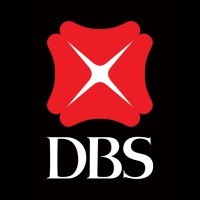
Agricultural Bank of China
wholly state-owned



wholly state-owned

DBS is a leading financial services group in Asia with a presence in 19 markets. Headquartered and listed in Singapore, DBS is in the three key Asian axes of growth: Greater China, Southeast Asia and South Asia. The bank's "AA-" and "Aa1" credit ratings are among the highest in the world. Recognised for its global leadership, DBS has been named “World’s Best Bank” by Global Finance, “World’s Best Bank” by Euromoney and “Global Bank of the Year” by The Banker. The bank is at the forefront of leveraging digital technology to shape the future of banking, having been named “World’s Best Digital Bank” by Euromoney and the world’s “Most Innovative in Digital Banking” by The Banker. In addition, DBS has been accorded the “Safest Bank in Asia“ award by Global Finance for 14 consecutive years from 2009 to 2022. DBS provides a full range of services in consumer, SME and corporate banking. As a bank born and bred in Asia, DBS understands the intricacies of doing business in the region’s most dynamic markets. DBS is committed to building lasting relationships with customers, as it banks the Asian way. Through the DBS Foundation, the bank creates impact beyond banking by supporting social enterprises: businesses with a double bottom-line of profit and social and/or environmental impact. DBS Foundation also gives back to society in various ways, including equipping communities with future-ready skills and building food resilience. With its extensive network of operations in Asia and emphasis on engaging and empowering its staff, DBS presents exciting career opportunities. For more information, please visit www.dbs.com
Security & Compliance Standards Overview












No incidents recorded for Agricultural Bank of China in 2025.
No incidents recorded for DBS Bank in 2025.
Agricultural Bank of China cyber incidents detection timeline including parent company and subsidiaries
DBS Bank cyber incidents detection timeline including parent company and subsidiaries
Last 3 Security & Risk Events by Company
Angular is a development platform for building mobile and desktop web applications using TypeScript/JavaScript and other languages. Prior to versions 19.2.16, 20.3.14, and 21.0.1, there is a XSRF token leakage via protocol-relative URLs in angular HTTP clients. The vulnerability is a Credential Leak by App Logic that leads to the unauthorized disclosure of the Cross-Site Request Forgery (XSRF) token to an attacker-controlled domain. Angular's HttpClient has a built-in XSRF protection mechanism that works by checking if a request URL starts with a protocol (http:// or https://) to determine if it is cross-origin. If the URL starts with protocol-relative URL (//), it is incorrectly treated as a same-origin request, and the XSRF token is automatically added to the X-XSRF-TOKEN header. This issue has been patched in versions 19.2.16, 20.3.14, and 21.0.1. A workaround for this issue involves avoiding using protocol-relative URLs (URLs starting with //) in HttpClient requests. All backend communication URLs should be hardcoded as relative paths (starting with a single /) or fully qualified, trusted absolute URLs.
Forge (also called `node-forge`) is a native implementation of Transport Layer Security in JavaScript. An Uncontrolled Recursion vulnerability in node-forge versions 1.3.1 and below enables remote, unauthenticated attackers to craft deep ASN.1 structures that trigger unbounded recursive parsing. This leads to a Denial-of-Service (DoS) via stack exhaustion when parsing untrusted DER inputs. This issue has been patched in version 1.3.2.
Forge (also called `node-forge`) is a native implementation of Transport Layer Security in JavaScript. An Integer Overflow vulnerability in node-forge versions 1.3.1 and below enables remote, unauthenticated attackers to craft ASN.1 structures containing OIDs with oversized arcs. These arcs may be decoded as smaller, trusted OIDs due to 32-bit bitwise truncation, enabling the bypass of downstream OID-based security decisions. This issue has been patched in version 1.3.2.
Suricata is a network IDS, IPS and NSM engine developed by the OISF (Open Information Security Foundation) and the Suricata community. Prior to versions 7.0.13 and 8.0.2, working with large buffers in Lua scripts can lead to a stack overflow. Users of Lua rules and output scripts may be affected when working with large buffers. This includes a rule passing a large buffer to a Lua script. This issue has been patched in versions 7.0.13 and 8.0.2. A workaround for this issue involves disabling Lua rules and output scripts, or making sure limits, such as stream.depth.reassembly and HTTP response body limits (response-body-limit), are set to less than half the stack size.
Suricata is a network IDS, IPS and NSM engine developed by the OISF (Open Information Security Foundation) and the Suricata community. In versions from 8.0.0 to before 8.0.2, a NULL dereference can occur when the entropy keyword is used in conjunction with base64_data. This issue has been patched in version 8.0.2. A workaround involves disabling rules that use entropy in conjunction with base64_data.